Advent
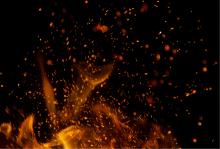
The falsehoods are so thick, the hypocrisies so outrageous, the corruption so rife, the processes so broken that you don’t know if you trust anyone anymore. The vulnerable are mocked or torn from their parents’ arms. Men in expensive suits say “Lord, Lord,” like they own air and mineral rights to the Most High. But their God, the one you thought—if but reluctantly—that you shared, is no god you recognize.
How can the pieces ever be put back together, the damage undone? What is gospel truth now?
A knot of self-righteous rage, tangled inextricably with despair, owns your gut. The accusing thought comes that you’re complicit. You’ve not done enough; you’ve saved no one. Guilt is the final straw. A voice not quite your own yet completely your own snarls: “Burn. It. Down.”
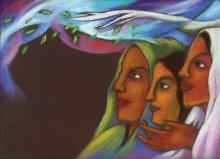
DID MARY KNOW, on that puzzling and fateful afternoon when the angel Gabriel visited her, that she was about to join a line of mothers in Israel who would be remembered and honored within a tradition dominated by men?
Did she think of her forebear and namesake, Miriam, co-deliverer of her people from Egyptian slavery? Did Deborah, prophet and judge, come to mind—or Jael, the housewife who drove a tent peg into the brain of an enemy general? Had anyone told this nonliterate young woman about Huldah, the prophet and scholar who identified Deuteronomy as sacred scripture? Surely Queen Esther, who saved her people from a Persian pogrom, was known to Mary from the annual festival of Purim.
More likely Mary would have remembered women in Israel who gave birth to important men, such as Samson and Samuel. The late pregnancy of her cousin Elizabeth brought Isaac’s mother, Sarah, into view.
But her own premarital pregnancy may have reminded her more of Bathsheba, mother of Solomon. In this patriarchal culture, wives who could not conceive were disgraced and considered of little worth, but pregnancy before marriage could result in an honor killing. No wonder Mary fled to Elizabeth as the only person who might understand her unusual plight (Luke 1:39-45). Guided by the Holy Spirit, Elizabeth enabled Mary to turn her fear into a song of praise adapted from Hannah’s prayer after her son Samuel was born (Luke 1:46-56; 1 Samuel 2:1-10). God lifts up the lowly and brings down the proud.
If she pondered her place in Israelite history, did Mary also think of more-recent heroes? If Hanukkah was celebrated in Nazareth each year, she would have known how the second temple in Jerusalem had been rededicated to Yahweh after its desecration by the Seleucid ruler Antiochus IV, 160 years earlier. Hanukkah acclaimed the successful Maccabean revolt and subsequent Judean independence; it also exalted Judith, whose name means “Jewish woman”; she saved Israel from destruction by beheading the Assyrian general Holofernes.
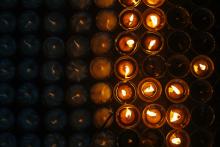
Lighting these candles—porous and buoyant—
Grounds us
Flames draw our eyes to heavens dotted white
With celestial thought
To look back in time through the stars
Hundreds of light-years away
To glimpse God standing
On the shore of God’s self
With outrageous visions and promises
Of hope that strain our belief
What can we do with such promises?
With tradition that grounds us in hope
In stars in candles in souls set alight?

Refusing Silence
The documentary film The Uncondemned tells how a group of international lawyers and activists, all under 35 when they began, fought to get the first conviction of rape as a war crime—and how Rwandan women defied death threats to testify and win justice. theuncondemned.com
Welcoming the Light
In The Light of the World: Daily Meditations for Advent and Christmas, Phyllis Zagano, writer and scholar of Catholic spirituality and women’s leadership in the church, offers incisive reflections and prayers to help readers “become quieter, slower even, pointing to the Christ who is to come.” Twenty-Third Publications
Power-Pop Prophets
The Shondes, a queer, feminist pop-punk band from Brooklyn, weave activist fervor with progressive Jewish prophetic imagination and spirituality: “Hope can anchor any strategy,” is a telling lyric. The melodious songs on their new album, Brighton, soar with violin and Louisa Rachel Solomon’s clear, strong voice. Exotic Fever Records
Home in a Strange Land
Words in Transit: Stories of Immigrants is a book of oral histories from nearly 30 immigrants and refugees who have settled in western New England. Edited by Ilan Stavans, with photographs by Beth Reynolds, it presents snapshots of the courage and gifts that flow to our country. New England Public Radio

We feel a deep darkness in our world and in our society right now. We can almost taste it, touch it, and smell it. This darkness invades our souls like a damp, long, December night, bringing a chill all the way inside.
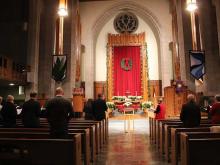
“We’re all born to live, to love and to die,” he said. “Between the birth and the dying the question is what do we make of it?"
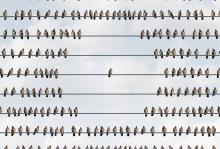
Jesus actively participated in the lives of everyone whom he met by offering them love, acceptance, and healing. He particularly sought out and served those whom religious folk deemed to be great sinners.

In this sense, Star Wars: The Last Jedi is an Advent movie. Director Rian Johnson’s wildly fun and thoughtful entry into the Star Wars canon finds its heroes at a precarious turning point. The film makes its characters grapple with the flaws of their established order, consider whether any of it is worth saving, and move forward by embracing the hopeful qualities of the Force and the Resistance.
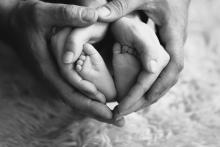
When we can name even the source of our hopes and fears as some kind of grace, we can actually experience God’s grace.
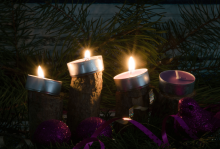
God of wholeness,
come and fill our hearts and minds,
and our bodies
with deep abiding love.

This has been a devastatingly difficult year for many of us, to say the least — even for those of us whose homes and families haven’t been directly hit by any of the ongoing wars, natural disasters, or the reckless actions of the current president. Around this time last year, many in our country were insisting we needed to withhold judgment and give #45 a chance. While some church leaders led us in lament after the election, too many in our churches urged us to “wait and see.” More than 10 months in now, we’ve had time enough to witness more grievous offenses than we thought were possible from anyone in that office within such a brief period.

NOW THAT WE can say “Merry Christmas” again (Did we forget to thank you for this? Thanks. No, really. Thanks a lot.), I wanted to cut to the chase with my wish list this year. It’s short.
I would like a white people intervention. Please get as many white Christians—progressive and evangelical—in the same room for a cleansing flood of white tears, some deep breathing and healing prayer, and time to plan to dismantle white supremacy. As just one of several million Asian Americans, I can only do so much to keep educating white people about the system their ancestors—who did or did not enslave people or benefit from slavery (by the way, all Americans who aren’t African American benefitted from the evil of slavery)—created and continued to adapt and adopt.

When nations turn toward trouble
and hope seems all but gone,
when threats and conflicts double,
what can we count upon?

ADVENT MARKS THE BEGINNING of the Christian year, for many. We await the return of Jesus and prepare for it by revisiting the story of his first coming. In Isaiah 64, the prophet longs for God to tear the heavens and come down, a description more apt for the latter return of Jesus than his first appearance. The longing for Jesus to return and fix the world’s mess escalated for many last year about this time and was expressed by a widely read online Advent devotional under the hashtag F**kThisS**t. (The original title was unapologetically uncensored. The originators argued that “to convey a visceral gospel, we must sometimes use visceral language.”)
There is a theology that says one day God will clean house and fix everything. In the meantime, we have to live here. Advent is about waiting and preparation. What shall we do while waiting for the return of Christ? What can we do about the state of the world? The gospel for the second Sunday in Advent calls for spiritual work, confessing and repenting sins (Mark 1:4-5). The following week the gospel suggests that there is work to which we can put our hands: “Make straight the way of the Holy One” (John 1:23).
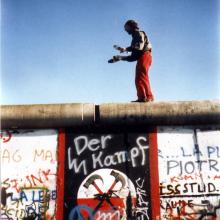
The wall wasn’t supposed to come down.
Günter Schabowski, a spokesperson for the East German Politburo, was tired. He hadn’t thoroughly read the travel regulation updates, handed to him shortly before his news conference. He didn’t know the document’s shifts in rhetoric, developed by leaders in the East German government, were simply an attempt to appease the swelling ranks of East Germans demanding reform. On Nov. 9, 1989, facing journalists’ cameras and notepads, Schabowski took questions for a forgettable almost-hour. Then someone asked about rumors the border may open.
Schabowski mumbled over his answer, confused. But a few of his words were clear: “Immediately ... right away.”
Reporters pounced. Breathless reports in West German media soon filtered over the wall through East Germans’ pirated signals. The Politburo had assured checkpoint guards that no changes had been made, but it was too late—a trickle of curious East Berliners quickly grew to massive crowds, yelling “Open the gate!” At a loss, and unable to get through to leadership for clarification or backup, the guards eventually gave in. Within hours, nearly 40 years of iron-fisted East-West divide was undone.

One of the most familiar biblical passages to be read during Advent is from Isaiah 9:6: “For to us a child is born, to us a son is given, and the government will be on his shoulders. And he will be called Wonderful Counselor, Mighty God, Everlasting Father, Prince of Peace.”
At the time it was spoken, the whole world was falling apart, or so it seemed to the eighth-century prophet Isaiah. Looking over history at a string of failed rulers, and staring into the abyss at ongoing chaos and political disaster, Isaiah looked forward to a time when God would send an heir to the throne who would be a different kind of ruler, a divinely appointed one (the Messiah), and his name would tell his character. Isaiah promised a people whose hope was failing that a baby would be born.
But where do babies come from? They come from women, women who endure the discomforts of pregnancy and the excruciating pain of labor to bring forth life. Except for in the most tragic circumstances, the joy of birth comes after the culmination of many months of sacrifice and uncertainty by the mother in pregnancy and is her just due for hours or days of the agony and uncertainty of labor.
No wonder childbirth is a common trope in scripture for political crisis and uncertainty. Childbirth (and pregnancy) spotlight a mother’s sacrifice, discomfort, suffering, and the unknown outcome of her labor. Divine deliverance will come, but not without near-unbearable periods of turmoil, disaster, uproar, and darkness.

In January 2016, the Rev. Cynthia Meyer told her United Methodist Church congregation she felt “called by God to be open and honest” about who she is: “a woman who loves, and shares her life with, another woman.”

On Jan. 21, I’ll join thousands in D.C. for the Women’s March on Washington. My first stop will be at a local congregation, one of several hosting a prayer service and warming station for marchers. I’m an anti-racist, feminist, Christian, and for me, faith will be part of the day.
I’ve been disappointed with Christian silence, and even active resistance, to social justice imperatives, but my commitments to justice stem from my faith, and that’s why I march.

If irony wasn’t dead, I’d say how ironic it was that in the midst of this season of Advent, in which we look to the nebulous future, a time-not-yet shaped by our ability to be patient and hopeful and tense and a bit sorrowful about what we cannot see but hope we shall soon see, our societal life is filled with those for whom there is no future.
